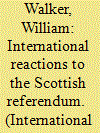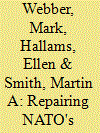|
|
|
Sort Order |
|
|
|
Items / Page
|
|
|
|
|
|
|
| Srl | Item |
| 1 |
ID:
133280


|
|
|
|
|
| Publication |
2014.
|
| Summary/Abstract |
The referendum on whether Scotland should become an independent country will be held on 18 September 2014. This article reflects on the evolution of foreign governments' attitudes towards the referendum since its confirmation in October 2012, and on their expectations should a 'yes' vote result. With few exceptions, they have adopted a policy of non-intervention, treating the referendum as the UK's domestic affair. President Obama's expression on 5 June 2014 of his desire for the UK to remain 'a strong, robust, united and effective partner' may, however, be seen as a sign of increasing apprehension abroad. Concerns of foreign governments aroused by the referendum include the diminution of the UK's power and role in international affairs, the possible encouragement of other secessionist movements, and disturbance to international organizations and alliances. It is commonly assumed that Scotland would become a reasonably prosperous and reliable small state. But how would the rest of the UK (rUK), a much more powerful and populous country, respond to 'the loss of Scotland'? How would it affect the UK's already unsettled relations with the EU, including the prospect of a referendum on EU membership? Despite many uncertainties and a febrile political atmosphere, it is widely expected abroad that Scotland and rUK would settle into a cooperative relationship after a difficult transitional period, and that an independent Scotland would be accepted into the EU and NATO if it displayed flexibility on important issues.
|
|
|
|
|
|
|
|
|
|
|
|
|
|
|
|
| 2 |
ID:
133282


|
|
|
|
|
| Publication |
2014.
|
| Summary/Abstract |
NATO moves toward its next summit (to be held in Newport, Wales in September 2014) in a mood of anxiety and uncertainty. This is not simply because telling questions are being asked of the alliance in relation to Afghanistan and Ukraine, but because the twin motors which have sustained NATO now show signs of considerable wear and tear. The first of these motors relates to principles of purpose. This encompasses the activities (or purposes) which NATO has consciously pursued in the last 25 years: namely, operations, enlargement, partnership, transatlanticism and security. The second is principles of function: the means, in other words, by which NATO is kept in motion. Here, American leadership, cohesion and trust, burden-sharing and credibility all matter. These motors are not about to completely break down (NATO has underlying strengths which make that unlikely) but they do need attention. NATO's good health requires it to focus on a series of core tasks-what this article refers to as readiness, reassurance and renewal. These three tasks speak to an agenda of consolidation and preservation, rather than one of task expansion. But this is not a conservative agenda; grasping the nettle of prioritization and focus requires, in itself, a certain foresight and enterprise. Managed successfully, it is an agenda that will preserve and strengthen NATO in what are increasingly troubled times.
|
|
|
|
|
|
|
|
|
|
|
|
|
|
|
|
|
|
|
|
|